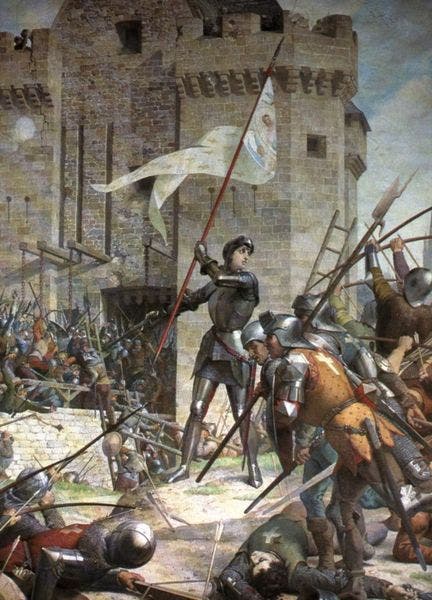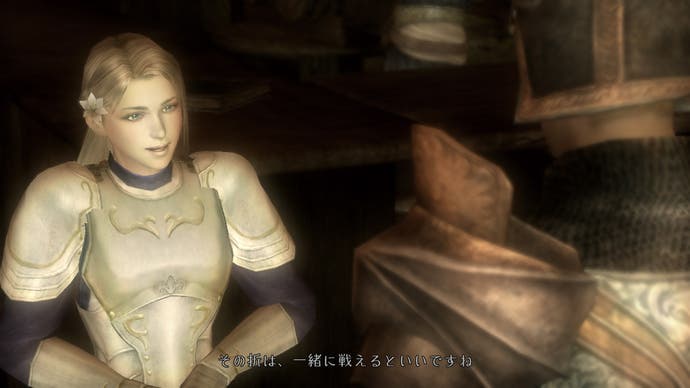A History of Abuse
Or, how dinosaurs ate Henry VIII.
These days, videogames are getting the blame for everything: for making people violent; for declining standards of literacy; for England being rubbish at football. One of the few things they haven't been blamed for yet, however, is making people worse at history.
Until now. So, in the interests of truth and objectivity - in the interests of a generation who might otherwise believe that the fashion in pre-industrial societies was for chainmail bikinis and soft-rock hair; in the interests of those who might have thought that the Americans were the only ones who fought the Nazis; in the interests of everyone, everywhere, who's ever slammed a joypad down in fury at yet another historical gaffe - it's time to call the videogame industry to account for perverting the course of history. It's time to call the videogame industry to account for its long record of crimes against history and its rampant devotion to inaccuracy across the ages, from the dawn of civilisation to the present day.
In fact, the dawn of Civilization is as good a place to start as any. You might think that Sid Meier's opus is an innocuous enough strategy title, with the potential benefit of giving gamers a grand overview of the course of mankind's history on Earth and providing counterfactual historians with a sandbox in which to test their theories. You'd be wrong. Quite aside from the obvious ridiculousness of primitive warriors taking out tanks and gunships with little more than spears, the most idiotic thing about the game is the way it endorses a Whiggish view of history, in which progress is inevitable, and any sort of national difference in technology or culture is suppressed.

What's worse, that notion of history is modelled, as historian Matthew Kapell has noted (in "Civilization and its Discontents: American Monomythic Structure as Historical Simulacrum." Popular Culture Review Vol. XIII, No. 2 (Summer): 129-136, Wikipedia fans), on American myths of progress and the frontier. I mean, everybody knows that British progress is better than all the other kinds (well, except for Washington State University's Aaron Welchel, who complains that "Even Civ III, by far the most robust and historically correct program, forces progress through Ancient, Middle, and Industrial ages conceptualized through a Eurocentric lens."
But it's not just highbrow games like Civilization that are wreaking havoc on our children's education. One of the things I almost never boast about on the internet (or anywhere else) is that the government once paid me money to study medieval haircuts. Actual, real, money. My specific area of expertise was the court of William Rufus (son of William the Conqueror), where, one observer noted, they all wandered round 'with mincing gait' and long hair. But my interest extends well into subsequent centuries. So it's with some degree of authority that I can tell you that, in spite of many commendable nods to historical authenticity, Koei's Bladestorm doesn't, actually feature historically authentic haircuts.

If you've played the game, you might also be surprised to learn that, although many mercenaries took to the field of battle during The Hundred Years War, there were no samurai involved in the conflict. Nor were there any ninja. Or elephants. Or camels, or mamluks, or South China spearmen, or Wizards. Of course, if your knowledge of The Hundred Years War derives from Jeanne D'Arc, instead of Bladestorm, you'll have entered a whole other realm of historical misunderstanding. To put the record straight, then: the English army was not controlled by occultist masterminds during The Hundred Years War, and it didn't field armies of demons. Sorry, but it just wasn't, and it didn't. Ask any historian.
You should probably also ask any historian about World War II, instead of believing what the videogames tell you. Indeed, many of the first-person shooters set during World War II are particularly insidious, conveying a dramatically convincing version of reality thanks to whizzy technical effects, grainy newsreel footage, and spiffy set-pieces, such as Medal of Honor: Allied Assault's Omaha Beach landing. But they usually combine that with a grossly oversimplified account of events - of the people and politics behind the conflict, and what it was really like to participate in it - and they make a mockery of the theory that only 15-20% of front line American troops actually fired their weapons at the enemy. Or they introduce silly super technology, or secret units that never existed, like in the (otherwise brilliant) Secret Weapons Over Normandy. Still, be thankful you don't live in Germany, where the Nazis are airbrushed out of everything.

Moving to more recent history, however, not even innocuous titles like Singstar '80s seem to be able to get things entirely right. Sure, there's no disputing that the songs that come on the disc are bona fide chart-storming hits, but where's the variety? Where are The Wedding Present's early hits, such as Brassneck, or Kennedy? There's not a single entry from Fleetwood Mac's magisterial Tango in the Night - not even Everywhere. No Morrissey. No Julian Cope. And if you played through the game from start to finish, you could be forgiven for thinking that acid house and/or Madchester never happened. What a poor representation of one of the richest of modern musical eras!
Perhaps the most baneful element of videogames and their attitude to history, though, is the way that PR people, in their quest for bullet points that they can put on the back of the box, will make all sorts of dubious claims about a game's historical veracity (eg. Hank Keirsey, military advisor on the Call of Duty series: "in the case of World War II games, I think it taught history".). It's hardly surprising: after all, with the games industry blamed for almost all of society's ills, it's nice to pretend that they're good for you. But the next time you play a game that claims to be 'historically accurate', just remember, it probably isn't. That way, you'll be okay. Except you won't be able to spell, or play football. On the bright side, you will be better at hitting people. Probably.







